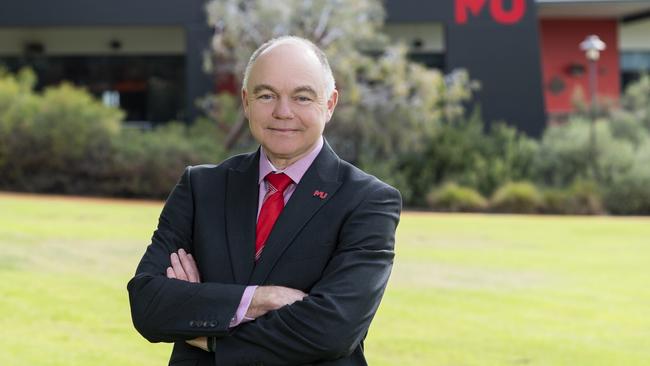Murdoch University chief Andrew Deeks warns against international student tax
University chief warns against international student tax because it will be easy to increase or divert for other purposes.

A university leader says if the international student tax proposed in the Universities Accord were implemented, it would be a tempting source of revenue for governments to easily increase or divert to other purposes.
The review’s interim report released last week put forward the idea of putting a levy on tuition fees paid by international students to meet general higher education needs such as research and university infrastructure, or to help universities through sudden shocks such as another pandemic or geopolitical instability.
Murdoch University vice-chancellor Andrew Deeks said once such a levy was imposed, governments would be tempted to increase it or use it for purposes other than for higher education.
He said an international student levy could be easily hiked or diverted because it would be paid by international students who had no vote in Australian elections. “Any time someone generates a levy, there’s a danger it ends up going into general revenue for the government, particularly when people don’t have a say at the ballot box,” he said.
“It would be an easy source of extra revenue when governments fell on harsh times,” he added.
The Universities Accord interim report did not suggest how much an international student levy would raise, or how it would be structured. It said further examination was required, “including some level of co-investment from governments”.
Tuition fees paid to universities by international students (worth $8.7bn in 2021) are currently a large pool of untaxed revenue. Universities are not taxed on their international student business because they are not-for-profit bodies.
International student revenue is highly concentrated in the five big universities that are magnets for higher paying students – Sydney, UNSW, Melbourne, Monash and Queensland. These five earned $4.5bn from international student fees in 2021, more than half the total for all universities.
Murdoch University, which Professor Deeks leads, earned only $53m from international students in 2021. Nevertheless he warned against a levy, saying each individual university should be able to decide how fees from its international students should be spent. “I fundamentally see it (a levy) as a mechanism with a lot of risk attached. It’s also not good for collegiality within the (university) system,” he said.
Swinburne University vice-chancellor Pascale Quester also voiced doubt about a levy, saying governments would likely be tempted to allocate the revenue from a levy in their own way. “The devil will be in the detail,” she said.
The idea for a levy was originally put to the accord panel by two universities, the University of Newcastle and the University of Technology Sydney.
University of Newcastle vice-chancellor Alex Zelinsky said the fundamental problem was that universities that did not have large revenue streams from international students were struggling with aging infrastructure and other needs, and a mechanism was needed to deal with this.




To join the conversation, please log in. Don't have an account? Register
Join the conversation, you are commenting as Logout